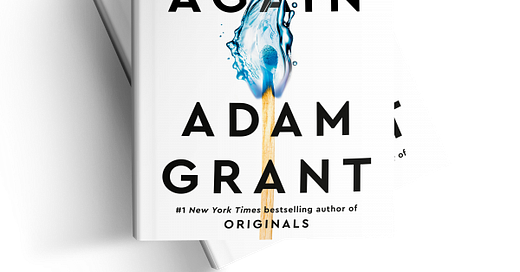Late last night I finished Adam Grant’s book, Think Again: The Power of Knowing What You Don’t Know. I’ve long hated the statement, “you don’t know what you don’t know.” I once had a church elder - my boss in the church polity I was in at the time - who criticized me harshly saying “you just don’t know what you don’t know.”
That’s Obvious!
He was right. I didn’t know what I didn’t know, but here’s the twist, he didn’t know what he didn’t know either.
No of us know what we don’t know - at least not completely. I’ve read 20 books on NASA’s manned missions to the moon. I know a lot about the Mercury, Gemini, and Apollo Missions. Math-challenged as I am, I know I don’t know the engineering behind lifting a Saturn V rocket off the earth.
At the same time, in multiple areas of knowledge, there are myriad facts I don’t know that I don’t know. And there are just as many facts that he didn’t know he didn’t know too (I’m surprised he didn’t know that.) It’s easy to see the blindspots other people have. It takes a more functional and determined mind to seek out our own.
So, how are we to become the kind of people who are better at learning what we don’t know? Adam Grant says thinking is not enough. We have to rethink what we think. Rethinking means questioning, not only conventional wisdom, accepted dogmas, and our ideological opponent’s beliefs, but interrogating our own thoughts, ideas, and opinions. Grant writes:
“Questioning ourselves makes the world more unpredictable. It requires us to admit that the facts may have changed, that what was once right may now be wrong. Reconsidering something we believe deeply can threaten our identities, making it feel as if we’re losing a part of ourselves. Rethinking isn’t a struggle in every part of our lives. When it comes to our possessions, we update with fervor. We refresh our wardrobes when they go out of style and renovate our kitchens when they’re no longer in vogue. When it comes to our knowledge and opinions, though, we tend to stick to our guns. Psychologists call this seizing and freezing. We favor the comfort of conviction over the discomfort of doubt, and we let our beliefs get brittle long before our bones. We laugh at people who still use Windows 95, yet we still cling to opinions that we formed in 1995. We listen to views that make us feel good, instead of ideas that make us think hard.”
Living With Doubt
We have to become more comfortable, being uncomfortable with our ideas. Interrogating our own ideas may be the best way to learn what we don’t know. And what could be more crucial in our contemporary world?
Your politics, Biblical interpretations, and views of which policies and behaviors create the most human flourishing may not be wrong. When was the last time you questioned them? When was the last time you sat with a conversation partner, not to pick apart their ideas, but to invite them to pick apart yours.
What if never changing your mind doesn’t mean you’re consistent? What if it means you don’t think? You don’t rethink?
Does your idea wardrobe need to be refreshed?




